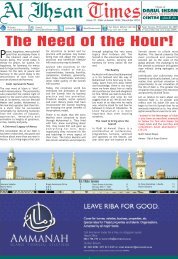TheRamadan of Shaykh Al-Hadith Ml ZakariyyaKandelwi by Dr Muhammad Ismail Memon Madani
TheRamadan of Shaykh Al-Hadith Ml ZakariyyaKandelwi by Dr Muhammad Ismail Memon Madani
TheRamadan of Shaykh Al-Hadith Ml ZakariyyaKandelwi by Dr Muhammad Ismail Memon Madani
Create successful ePaper yourself
Turn your PDF publications into a flip-book with our unique Google optimized e-Paper software.
the ramadan <strong>of</strong> shaikh muĤ ammud zakariyyĀ<br />
One Benefit <strong>of</strong> the Gathering in Faisalabad in<br />
Ramadan <strong>of</strong> 1400/1980<br />
As an expression <strong>of</strong> my gratefulness to <strong>Al</strong>lah u, I would like to<br />
mention one more important point since <strong>Al</strong>lah u blessed me with<br />
the opportunity to be in Faisalabad this Ramadan .<br />
The month <strong>of</strong> Ramadan is the best time for the practice and<br />
devotions <strong>of</strong> taśawwuf. The practice <strong>of</strong> 40 days <strong>of</strong> i‘tikāf adopted<br />
from the elders [which is now in practice in Sahāranpūr and other<br />
places in India] had not yet been established in Pakistan. The<br />
l<strong>of</strong>ty objective [the revival <strong>of</strong> dhikr <strong>of</strong> <strong>Al</strong>lah u in the umma]<br />
<strong>of</strong> spreading this practice to other places in the world (using the<br />
Ramadan <strong>of</strong> Faisalabad as a model) was why Ĥađrat left Madina to<br />
spend his Ramadan in i‘tikāf in Faisalabad [despite his deteriorating<br />
health and weakness].<br />
When the schools are in need <strong>of</strong> help or aid, they call upon the<br />
people and take help from them. Likewise is the case with any other<br />
work <strong>of</strong> Dīn. The nature <strong>of</strong> the khanqā system runs contrary to this<br />
as taśawwuf is about eliminating the self and being vigilant over<br />
ones internal state. This is why we never see anyone calling others<br />
to open their khanqā. For this reason, Shaikh Yaĥyā and I decided<br />
to establish a model <strong>of</strong> the khanqā system in Karachi, as there has<br />
been one for the people <strong>of</strong> Punjab in Faisalabad, and as many <strong>of</strong><br />
Ĥađrat’s successors reside in Karachi. If these scattered lights and<br />
powerhouses gather together they can establish a khanqā system<br />
there. We shared our idea with Shaikh ‘Abd al-Ĥāfiż, who gave<br />
his full support and called Shaikh <strong>Al</strong>-Ĥāj Muĥammad Zubair, his<br />
brother Muftī Shāhid, and Shaikh Yūsuf Ludhiānwī to gather in<br />
one place for dhikr. In this setting, they would be able to guide<br />
and help others in the path <strong>of</strong> sulūk, establish the system <strong>of</strong> bai‘a<br />
and spread the dhikr <strong>of</strong> <strong>Al</strong>lah u. They would have one combined<br />
khanqā like the khanqā <strong>of</strong> Thāna Bhawan where the successors <strong>of</strong><br />
Miāńjī Nūr Muĥammad, Ĥađrat Hājī Śāĥib, Ĥađrat Ĥāfiż Ďāmin,<br />
76



